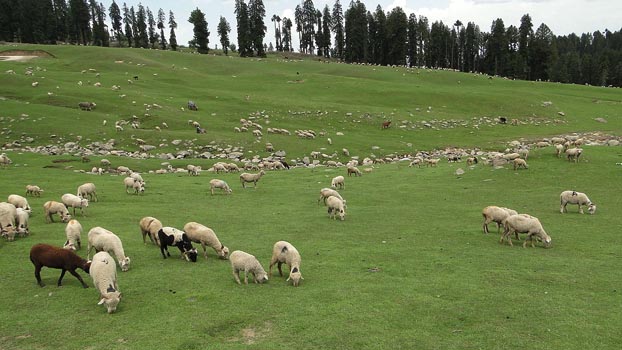Rights to the unseen: Gujjars and Bakarwals

Every year in winters the nomadic tribes of Gujjar and Bakkarwal descend from the Himalayas in Jammu and Kashmir to greener pastures in the north-Indian plains. Come summers they retrace their steps back to the mountains with their cattle.
The nomadic, tribal community came to inhabit the northern part of India in the early 12th century. Since then they have lived in these areas, moving freely across state boundaries, bound by only nature and their traditions.
Though clear data regarding their numbers is not available, as their nomadic lifestyle has kept them out of various census exercises, estimates put the population of the Gujjar Bakkarwal community anywhere between 15-20 percent of the total population of in the Union Territory of Jammu and Kashmir. Spread all over the territory of Jammu and Kashmir, the community pre-dominantly practices the Islamic faith interwoven with its tribal traditions.
Over centuries, the community has moved between the nooks and crevices of the northern Himalayas. Scraping a livelihood by selling milk, the community depends on the land and forests for grazing their cattle. The forests in this ecologically sensitive part of the world are also equally dependent on the community for its conservation.
In India, the relationship between man and nature has long been honoured as a spiritual bond. During the colonial period, the wealth of forests was diverted to meet economic needs without any regard to the conservation of forests and rights of the forest dwellers that inhabited them.
While procedure for settlement of rights was provided under statutes such as the Indian Forest Act, 1927, these were hardly followed till after India gained independence. The tribal and forest-dwelling communities, continued to live inside the forests in tenurial insecurity.
The symbiotic relationship between forests and forest-dwelling communities finally found recognition in the National Forest Policy of India in 1988. The policy called for the need to associate tribal people in the protection, regeneration and development of forests.
The Scheduled Tribes and Other Traditional Forest Dwellers (Recognition of Forest Rights) Act, 2006, was enacted to balance the right to environment with the right to life and livelihood. 2006 Act recognises the rights of the forest dwelling tribal communities and other traditional forest dwellers to forest resources, on which these communities are dependent for a variety of needs, including livelihood, habitation and other socio-cultural needs.
Classified as a Scheduled Tribes community ideally the Gujjar Bakkarwal community too should have enjoyed the rights provided to them under the 2006 legislation.
However, a peculiar constitutional provision which allowed the esrtwhile state of Jammu and Kashmir in India to pick and choose the central laws that would apply to the state, kept the 2006 act from being implemented in the territory.
As the 2006 act remain unimplemented for over a decade, the state floundered in its policy making for the tribal communities, perpetuating the insecurity that the communities faced. Threats of forced evictions in turn threatened access to land, livelihood and to other services such as healthcare and education for children.
After a constitutional amendment in 2019, the Forest Rights Act – was extended to the territory by the Indian Parliament.
The Act gave back to the community their rights to freely access, independently manage and govern forest lands and all other resources related to forests, within village boundaries, providing livelihood security and a hope for the future generations.
Simultaneously, in May 2021 the Government also launched a survey of all migratory and tribal population to help nomadic communities access schemes and development programmes.
The tribal community in Jammu and Kashmir is by no means the only community to benefit from the recent amendment.
Sixty-three years after their arrival in the state as “sanitary workers” on the request of the then government, members of Valmiki community are also hopeful of a bright future for their children, as they finally receive permanent residence certificates in Jammu and Kashmir.
Despite having lived for six decades in the region, the community had limited to no access to education and employment, as the lack of a residency certificate kept the people out from jobs which reserved seats for ‘local’ residents.
The disaffected community waged a legal battle in various courts for ending the discrimination without success.
The peculiar local laws did not grant them the right to vote, or purchase land, unofficially making them second-class citizens in their state.
However after the constitutional amendment, the community voted for the first time in the 2020 local elections. Elders of the community profess hope that their children will live with honour and dignity in this land where their ancestors served.




